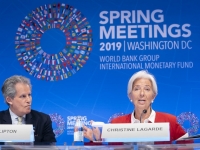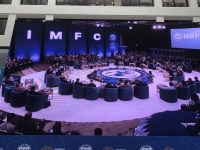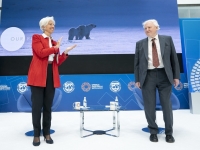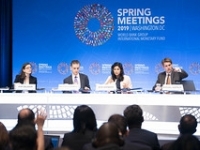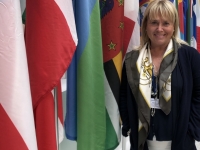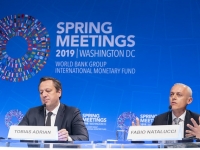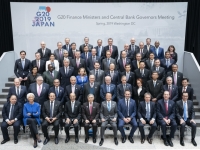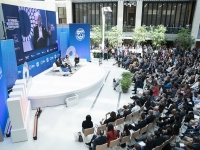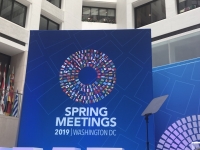Business
WORLD BANK GROUP AND INTERNATIONAL MONETARY FUND 2019:
MAJOR GLOBAL ECONOMIC CHALLENGES AHEAD
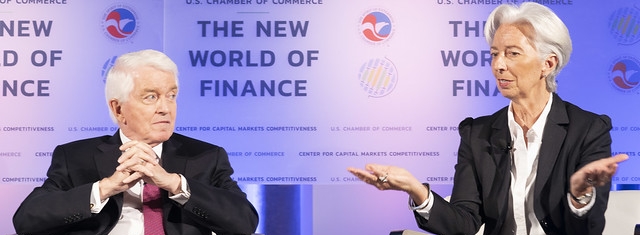
During the Spring Meetings of the Boards of Governors of the World Bank Group (WBG) and the International Monetary Fund (IMF), Washington, D.C.,April 8-14, 2019, which brought together central bankers, ministers of finance and development, parliamentarians, private sector executives, representatives from civil society organizations and academics to discuss issues of global concern, IMF Managing Director Christine Lagarde said that while her agency is forecasting a rebound in growth next year that forecast is “precarious and subject to downside risks“ with rising trade tensions a top threat.
Income Inequality Matters: How to Ensure Economic Growth Benefits the Many and Not the Few
Inequality in advanced countries has been a major issue, contributing to a loss of trust in institutions and democracy, and a sense that the elite have captured all the gains at the expense of the rest. Technology and globalization have created disruptions which we have not dealt with very well. The critical issue is not just inequality of income, but also inequality of opportunity and the fact that inequality is reproducing itself. While the middle class hollows out, tensions increase.
Addressing rising (domestic) inequality was a matter of urgency. We need to think more proactively about redistribution policies. One important aspect of inequality, especially in the US, is that real wages have stagnated. Policy options include redistributive taxation, minimum wages (although often controversial), and direct labor market policies. There is also a geographical aspect to inequality, and therefore argued there is a need for policies that foster regional mobility. Digitalization could help solve this problem as people can remain local and work remotely. There is scope to improve international taxation to ensure a level playing field and prevent corporations from “fishing for arbitrage“ and encourage them to pay their fair share of taxes where they create value and employ people.
Learning Matters: Why We Need a Learning Revolution.
While many countries have made tremendous progress in getting children into the classroom “” much more remains to be done to ensure that students are effectively learning and being equipped with the necessary skills for the jobs of the future. In her opening remarks, Vice President for Human Development Annette Dixon laid out the challenge; 60% of primary school children in developing countries fail to achieve minimum proficiency in reading, writing, and basic math. She stressed that to effectively respond, countries need to know the state of their education quality and how far they are from ensuring that all students learn.
In the first discussion, UK´s Secretary of State for International Development Penny Mordaunt implored countries to focus on improving learning outcomes and technical education with private sector support. UNICEF´s Executive Director Henrietta Fore stressed the need for a “learning backpack“ consisting of literacy, transferrable skills, entrepreneurship, language skills, combined with digital skills that will help prepare youth for the job market. Sierra Leone´s Finance Minister Jacob Jusu Saffa noted that historical conflicts in his country had caused a lack human capital wealth, requiring workers from other countries to fill the gap. This strengthens his resolve in ensuring that every child has the right to quality education, especially those with disabilities. Global Partnership for Education Chair Julia Gillard encouraged the sharing of what works best in countries for mutual learning and emphasized funding coordination to improve effectiveness.
In the second panel, Jordan´s Minister of Planning and International Cooperation Mary Kawar noted that even with the influx of refugees from Syria, all of their children have a right to education, achieved partly through Syrian and Jordanian teaching assistants working closely with schools, civil society, and government agencies to make learning happen. LinkedIn co-founder Allen Blue noted the need for skills such as teamwork and communications to complement technical skills. Annette concluded that the 4 critical ingredients to ensure the promise of learning for all are: prepared and supported leaners, motivated and trained teachers, effective and inclusive technology, along with meritocratic leadership and management, so that all students can learn the skills that machines will not be able to teach.
Rethinking International Cooperation Matters - Bretton Woods at 75
An interesting discussion on the future of our global cooperation offered Emmanuel Farhi, Ricardo Reis, Keyu Jin, Melissa Dell. While the US dollar remains the main global reserve currency, growing global demand for safe assets and historically low interest rates may lead to the reemergence of a “Triffin dilemma.“ New currencies will likely compete for reserve currency status, which could bring significant benefits, but the path is likely to be disorderly. Farhi noted that there is scope for modernizing the role of the IMF, possibly by administering a new global reserve facility, acting as a central counterparty clearing platform for bilateral swap lines, or by offering its own short-term swap facility.
The distinction between bilateral swap lines and IMF loans is becoming less clear and the IMF could act as an intermediary between the US Federal Reserve and central banks. The IMF could take on the risk exposure and set interest margins based on countries´ exchange rate risks. Reis also highlighted the IMF´s unique position to offer stress testing and asset quality reviews to its members. As China continues to integrate in the global economy, it will anchor global demand, provide liquidity in times of crisis, become a source of diversification for global portfolios, with the RMB potentially gaining reserve currency status. However, a more open China may also imply increased global volatility. Therefore, the pace of liberalization needs to be carefully considered. The IMF could play an important role in enhancing cooperation and could act as an intermediator to avoid confrontations among countries. There are long-lasting transitional costs from job disruption caused by trade and technological developments. For example, violence and drug trafficking have increased in Mexico as jobs were lost due to competition from China. Mounting evidence shows that these effects can last up to 30 years. Dell underscored the need to consider the distributional consequences and interlinkages of policies.
The Digital Age Matters: Money and Payments
Views and speculations on the future shape of the financial system were broad varying from a decentralized system akin to the open internet, in which consumers across the globe were empowered to engage with other economic actors without intermediation. A more reserved assessments, essentially viewing digital technologies such as cryptocurrencies and blockchains as complements to the current system was also presented considering the success of digital payment platforms such as Alipay in China or M-Pesa in Kenya suggests that mature technologies already exist. In fact, a digital version of the SDR could be rolled out in 12-24 months from a technological standpoint. The key factor, however, was establishing trust in the new system, and there was considerable debate about what engenders trust among consumers. Cryptocurrencies and blockchains are inherently trustworthy because they were immune from human fallibility or corruption so that consumers continued to trust large financial institutions, suggesting a path for offerings such as digital coins backed by traditional financial institutions. Thus the future of the financial system will be shaped by a complex mix of market forces, social preferences, and political considerations. While payments are just the beginning, the promise of technologies such as blockchain extend far beyond their application in digital payments.
There is a great potential to fundamentally restructure society allowing digital transactions to provide a wealth of embedded information about businesses, which could have broad implications for SMEs and consumers. Another good meeting Spring Meeting IMF, see you next year!
more information: https://www.ambassadorialroundtable.org

